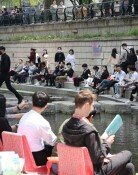Minister proposes allowing Japanese dramas into Korea
Minister proposes allowing Japanese dramas into Korea
Posted February. 25, 2011 10:06,
Culture, Sports and Tourism Minister Choung Byeong-gug hinted at an additional opening of the Korean market to Japanese pop culture Wednesday by saying, Now is the time to accept Japanese dramas.
A ministry source said, The minister said what he personally believed but were not considering the opening practically.
Choungs comment is expected to trigger robust discussion on the fifth opening of the Korean market to Japanese pop culture, whose last opening was in January 2004.
Contrary to our expectation that Korea might be culturally subject to Japan when we opened the door to Japanese culture a decade ago, the Korean Wave spread to Japan, Choung told a news conference at Korea House in downtown Seoul to mark his first month in office. Moreover, Korea is in a more advantageous position in many aspects culturally.
The ministers comments is apparently an expression of confidence that Japanese culture can no longer dominate in Korea since Korean pop songs and dramas are hugely popular in Japan.
In the Korean markets first opening to Japanese culture in October 1998, Korea embraced Japanese films that received awards at international film festivals in Cannes, Berlin and Venice and the Academy Award, as well as Japanese cartoons and comics.
In September 1999, the second opening was allowed for Japanese movies that received awards from about 70 global film festivals and indoor concerts of Japanese pop artists with less than 2,000 seats.
The third opening was in June 2000, when all films except for adult movies, sports and documentaries made inroads into the Korean market.
In the fourth round in January 2004, all movies and music in Japanese were allowed to enter.
Members of the Korean cultural industry showed a calm response to Choungs comments compared to those made in previous market openings.
Korea was highly dependent on Japanese culturally to the extent that it copied most Japanese dramas and education programs 10-20 years ago, but not now. I dont worry because Korean programs are now competitive and independent, said Song Chang-ui, production director at CJ Media.
Pop culture critic Lee Moon-won said, Most Japanese dramas are trendy dramas targeting 20- to 35-year-old women but they dont appeal to Koreans and lack dynamism. Japanese pop music lacks something to meet the higher standards of Korean consumers.
bluedot@donga.com







